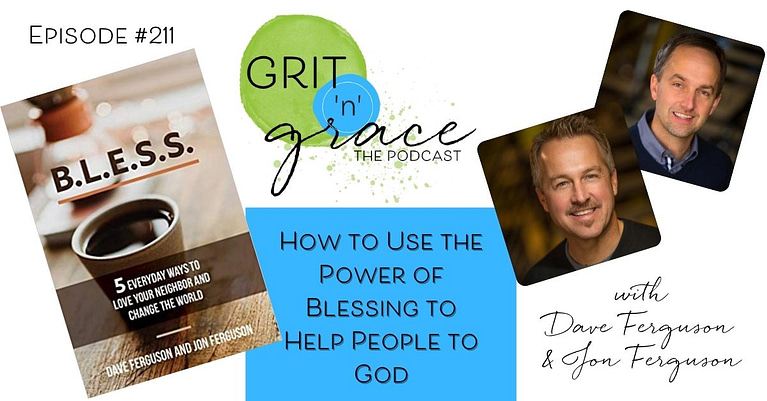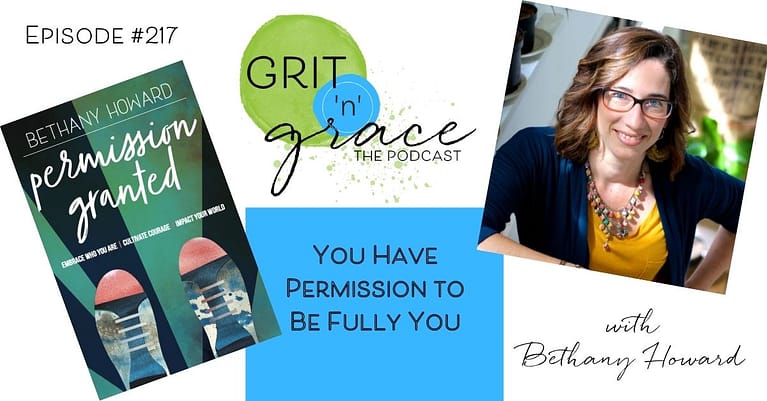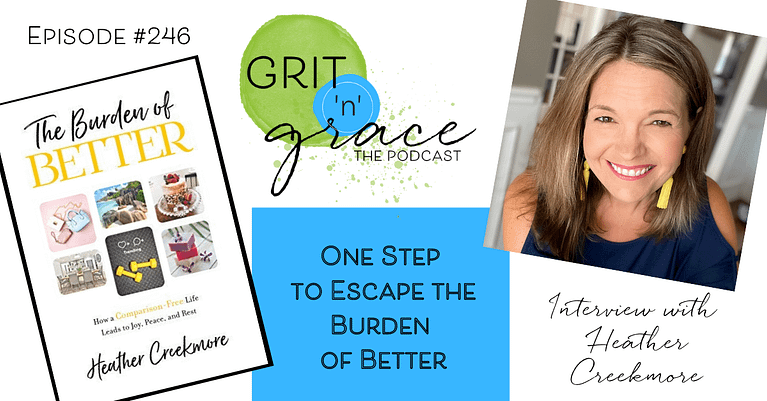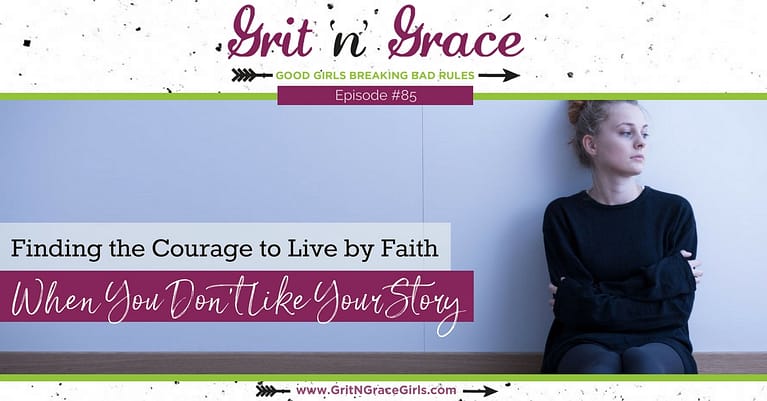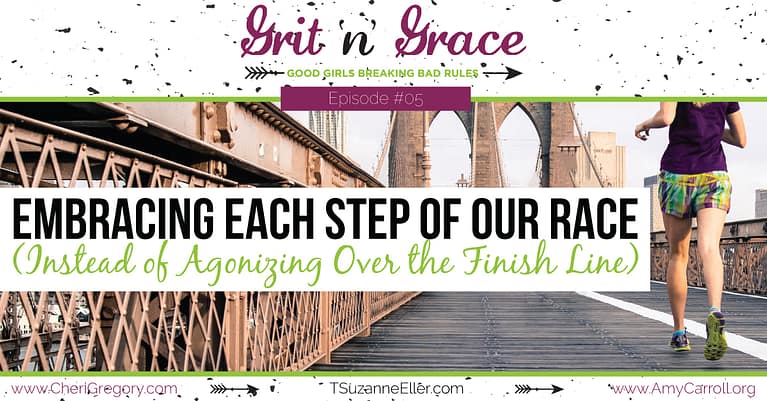
“Sometimes it’s just easier to be alone.” Have you ever thought that after wrestling with a complication of community? You’re not alone! Cheri and Amy have a candid conversation about the challenges of being in community. Ultimately, though, community has pay-offs that make the difficulties worth navigating. Listen in for encouragement that will leave you ready to dive back into deeper relationships again.
(This page contains affiliate links. Your clicks and purchases help support Grit 'n' Grace at no extra charge to you.)
Recommended Resources
Downloads
Your Turn
- What difficulties have made you want to leave a community or small group that you’re part of?
- What benefits made staying worth it?
- What do you see as the biggest benefit of community?
Transcript — scroll to read here (or download above)
****
Grit ‘n’ Grace: Good Girls Breaking Bad Rules
Episode #186: Why the Complications of Community are So Worth It
Amy:
So, Cheri, are you tired of winter yet?
Cheri:
Well, let, let me show you a picture from outside my front door. I don’t know if you can see that –
Amy:
Disgusting.
Cheri:
– that’s what winter looks like for me. So we have had nothing but clear blue skies, and it’s been a little cool. Like, it’s probably dipped down into the 50s for us. It’s been this way for like weeks.
Now, I will say we had one day of winds so bad that they uprooted a bunch of trees. We lost power, I had to clean the whole – well, I should clean the whole house. I haven’t done it yet, let’s be clear. But other than that, yeah.
I’ll post this picture so all of our listeners can, you know, have that same look that you have on your face.
Amy:
Disgust.
[Laughter]
Cheri:
Yeah. I don’t understand winter – I’m a California girl. So tell me about – You must be tired of winter if you’re asking the question. So do tell, educate me on winter.
Amy:
Well, North Carolina winter is so weird and we had the warmest winters, the last two. It’s strange because it’s, like, well if it’s going to be a winter, at least do something fun, you know?
So I will say I was, I was thinking I was tired of winter, just the dreary gray kind of drizzly days that we get a lot. However, we have a snow forecast this week, so I might have to reverse that ‘cause a little snow for a Southern girl – alittle snow, let me qualify that, is a fun thing for we southerners.
Cheri:
Well, this is Cheri Gregory.
Amy:
And I’m Amy Carroll.
Cheri:
– and you’re listening to Grit’n’Grace: Good Girls Breaking Bad Rules. The podcast that equips you to lose who you’re not, love who you are, and live your one life well.
Amy:
Today we’re talking about the power of community. Specifically being part of a small group.
Cheri:
And we’re going to be super duper practical. We’re going to talk about the top concerns about being in community and the top benefits of being in community.
Amy:
Okay. Now, Cheri, you have some cautions about being community. So what is that about?
Cheri:
Well, let’s be clear. These cautions really come from my regrets.
Amy:
Ahh!
Cheri:
These come from negative experiences. So, my number three caution is expecting too much, like, pushing myself in even when there’s clearly a mismatch between what I need and what the community or the small group can reasonably offer me, like leaning hard into this group of women when really what I need is to call up my counselor and have an appointment with her.
So expecting too much would be my would be my number three caution.
Amy:
I’ve been there, and I’ve also been on the other side of it where I became the therapist and that’s not good either.
Cheri:
Oh! I’m so sorry.
Amy:
So, it really is a challenge to make community balanced both for you and for the other people in the group.
And so, I love, actually, Cheri that we’re starting with the concerns ‘cause we’re saying out loud, I think, what some people feel, the reasons that keeps them out of small groups. So let’s just keep going.
Cheri:
All right. So my number two is actually the flip side. It’s expecting too little.
So, like, it’s glossing over a clear mismatch between my reasonable needs and an inflexible community culture because I want to belong so badly. Like, one time I remember I shared something rather personal with the group, and I was really expecting to hear things like “I understand; I’ve been through that too.”
And what I got was “Just pray about it.” and “Just trust God.” I needed more than that group was able to give.
Amy:
Yes. Well, mismatch happens, and I think that’s important to say out loud. I remember I was part of a group where I felt like I had worked and worked and worked and worked and worked to be close friends with this group of women and it just didn’t happen, you know, sometimes.
And they were all great people. It was not their fault. Sometimes there’s just not friendship chemistry and there wasn’t in this group. And I realized that I had started resenting the time that I was putting in, so there was too much work with too little return.
Cheri:
That makes sense. And then my number one caution is expecting just right to last forever.
So there’s expecting too much, expecting too little and expecting just right to last forever. I have a Goldilocks theme going on here.
And that’s so hard for me because when I’ve been part of a, I’m going to say quote unquote good small group, which simply means that I loved the dynamics that were happening in the moment, then I wanted nothing to change.
And I remember one year in particular, a key family moved. I was so upset by that change that when they came to me to to say goodbye, and they said, you know, “We love you.” I literally, my mouth opened and the words came out, “Well, if you loved me, you wouldn’t leave me.” And, you know, I was a grown adult.
But that was kind of how I felt in my heart cause they were ruining everything. But the truth was things can’t be just right forever.
Amy:
It’s really true and change is so hard. But this is where our understanding of seasons and things really helps, I think. And it’s important to know when a season is over.
Cheri:
Absolutely. So share your reasons, your top three reasons why you’ve avoided community.
Amy:
Well, mostly I’m a community girl, but there have been some times and some reasons that I just didn’t want to be in community.
And my number three, I guess we’re doing countdowns, right? is that I didn’t feel understood there. I remember there was one day I was part of two groups, and I actually met with each group in a day. And at the end of the day I sat in my car and cried.
Cheri:
Oh no!
Amy:
I did not feel that I belonged or was understood in either one. In one – it was hilarious – I was too Christian. So they just treated me like I was a total Jesus freak, which usually I embrace, but that day I didn’t.
And then, in the other group, I wasn’t Christian enough. So here’s this crazy dichotomy, and I just realized that I didn’t feel understood in either group.
It probably really, truthfully, it all boiled down to me. That I wasn’t confidently loving who God made me to be. You hear the insecurities in all that, but, whatever.
Cheri:
That’s a great point. And, this is so hard. I think for, for us, as women, and I’ll just speak for myself, I want to believe that community means that people will finally get me. That we’ll finally feel understood. That we’ll finally belong.
And you know that word finally, that’s a lot of loaded “Finally!”s to bring to a group of human women.
Amy:
Yes. That’s a lot of weight to put on a group of people.
Cheri:
What’s your second reason why you’ve avoided community?
Amy:
Well, there have been some periods of time when I prioritize Facebook time over face-to-face time. Again, this is my issue, right?
I did some interesting reading one day. There’s this guy, his nickname is Dr. Love, and he actually just studies the brain chemistry and bonding and that kind of thing. And what he said is that oxytocin, I always have to remember that “to” part ‘cause Oxycontin is a different podcast episode.
[Laughter]
Oxytocin, is what is released when hold a baby. It’s the bond. It’s the cuddle chemical. But oxytocin is released when we’re on Facebook, too, which is so wild, isn’t it?
Because it’s like our own brain participates in this deception that Facebook time is the same as face-to-face time. But you know, that period of time came to an end because I was so empty. But I actually avoided small groups cause I thought Facebook was enough for awhile.
Cheri:
Okay. So, what I really want to say is have you been actually talking for the last minute or two? No? Then we can just move on. And so, what I will actually say is why must you not only step on my toes but stand on them? That’s just, I thought we were friends, Amy. I thought we were friends. I love virtual reality. So, okay, now, now you’ve given me something to praycess.
Amy:
Well, it’s true, for those of us that work on our computer so much, like you and I, and so many of our listeners.
It’s just easier, right? It’s just easier, but it’s not the same.
Cheri:
Very true. I will, I will confess that readily. So what’s your number one?
Amy:
Okay, so I gave two that were my fault. But this one is other people’s fault.
[Laughter]
Sometimes I have avoided small groups because there’s a leader who struggles to lead. Now, I have to confess that I have been in small groups that are so spectacular and led by such amazing leaders that I’m kind of spoiled, to be honest, and I can get a little judgy, but here we go anyway.
So, there is some kind of balance that needs to be achieved in small groups between rules, or kind of – structure, I guess, and grace.
And I’ve had people on both sides of the extreme. I had one leader that she was a rules girl, but it stifled the interaction of the group. And then I had another leader in the same kind of setting where she didn’t follow the rules at all, and we actually had a shouting match in the middle of our small group between two of the women one day.
Cheri:
Oh no! That’s not good!
Amy:
So, there needs to be some kind of a balance.
And leaders are important, aren’t they? That’s why we did a Facebook group for leaders. If any of you are interested, send us an email to help try to train leaders.
Cheri:
Okay. I am reaching for a paper bag to hyperventilate in just listening to the idea of a shouting match in a small group that – oh my word.
Amy:
Yeah. It was awful!
Cheri:
Well, here’s the thing you know, that I’m getting my doctorate in leadership, and so I understand this potential of being judgy.
I have a head that is so full of theory it makes me dangerous. Like, it is so easy for me to sit back and watch a leader and diagram what they’re doing wrong.
But this is reminding me of every year I teach The Screwtape Letters to my AP students. And there is one particular line where basically he said, “God wants me to be a pupil, not a critic.”
And, ooh, that gets me every single time. Even if I supposedly think I know a lot about what’s happening when I’m there, when I’m in the group, to have the heart of a student who can learn rather than somebody who can pick things apart.
Amy:
So good. And we need to give our leaders grace for sure, but they can make or break a small group.
Cheri:
It’s true. It’s true.
Amy:
Yeah. All right. So let’s turn to the benefits of community. We wanted to say out loud some of the reasons that we avoid community, but community is so amazing.
Cheri:
Yes. All right. So again, doing the countdown, starting at number three, my favorite thing, one of my favorite things about community, about small groups, is I get a new perspective.
And, you know, I’ll come home, and I’ll be saying things like, I never thought of it that way. I would never would have seen it like that on my own when I hear somebody else’s stories. And one of the things that I try to do, because you and I both have the same, I share this overtalking talent. We have a talent for overtalking.
Amy:
That’s why we have a podcast.
Cheri:
Exactly.
Amy:
Yes.
Cheri:
And so, what I’ve tried to do over the last decade is be the last to talk or one of the last to talk rather than one of the first to talk. And, to try to do it while actually listening, not waiting for my turn, not, you know, giving body language thatsignals, hurry up and finish so I can talk.
But to really just be fully present, just to really listen, and to be okay if my idea or my story fades away. Or, if other people say something similar, to just be like, check, that one’s already done. Check, that’s already done.
And sometimes, and, to me, this is evidence of the Holy Spirit at work because it wouldn’t happen naturally. Sometimes I’m, like, actually, I don’t need to share anymore. I don’t need to say anything. I don’t need to hear my own voice anymore.
Unless, maybe it will be to just affirm and to say to the others, wow. And to kind of weave together, you said this, which I see connected to this and thank you. Thank you.
God is speaking into my life because of you. And so, that is my number three, gaining new perspectives.
Amy:
But I think that is great advice for all of us that are in small groups, to kind of police our own talking.
Cheri:
I’ve been known to pull out my cell phone, and actually, you know, like hit the timer when I start talking, because I lose track of time.
[Laughter]
I can be like, “Oh, it was 30 seconds, and it was 10 minutes.” It’s so embarrassing.
This is not in our notes. This is just like, oh my goodness, how did that happen?
Amy:
Yes. Me, too.
Cheri:
So there’ve been times I’ve not gone back the next week because I feel like they got too much in me and their previous week, and I don’t want to it again. So I guess that’s a bonus caution.
So, but there are ways, you know, like yeah, there are ways to self police, to self moderate.
Okay. So my number two would be – Okay, I do love to share my gifts. So, even though we just talked about self-policing, but there have been times, especially when, I think what I was trying to illustrate is pausing long enough for the Holy Spirit to prompt me to speak rather than my need to be heard, to prompt me to speak.
Because my need to be heard will always prompt me to talk as a, you know, as an extrovert. So, but to really recognize that, hang on a second, the conversation has been going on, and I do feel the Holy Spirit moving. And, the times where I’ve shared something that may be a little unique, a little, maybe it’s some research, maybe it’s an experience I had and then other people thanked me specifically,“Wow, I didn’t know that.” or “I hadn’t thought of it that way.”
So, it’s kind of the opposite. Like I gained new perspectives from them, but then I’ve been able to share something that is uniquely me, and then to realize that that met a need.
It wasn’t just that they – and this has taken me years. It’s not just that they tolerated me. It’s not just like, “Okay, everybody gets a chance to talk. So I guess Cheri gets one too.” They really did benefit from something I contributed
Amy:
Love that.
Cheri:
And then my number one favorite thing is – since my, I have finally embraced my identity as a collaborator, my favorite thing is collaboration.
And then what’s called co-creation of value. And that’s what happens. It’s almost like lightning in a bottle where something happens where you had to be there and that exact group of people had to be together for this thing to happen.
And it doesn’t happen every time, but sometimes, and it often, it takes the group a little while to kind of connect and bond with each other and kind of get to know each other well enough. But, sometimes, there will be a discussion where somebody shares and somebody shares that we’re reading scripture and watching a video and it just suddenly, it just exponentially grows.
And, like, a metaphor shows up and all sorts of understanding show up and ideas, and they don’t belong to anybody. Like, you walk away and you don’t remember who came up with what. Like nobody gets the credit. Nobody wants the credit, because you’re just sitting back and going, wow.
And ultimately, of course, look what God did in the midst of us. It’s not just the whole is greater than the sum of the parts. It‘s a hundred times better. It’s a thousand times better.
And, you could never have done that on your own. Never in a million, zillion, billion years. And it it was so cool to be there as it was happening! Just the best thing. And you float away. You float home.
And you can’t really describe it to anybody. It truly is one of those things where you had to be there. You had, I mean, like that’s what you tell your husband or other people, you had to be there. And so, then if somebody missed that week, you feel so bad cause they’re like, what did I miss? And you’re like – “Uh, I can’t even” –
Amy:
Everything.
Cheri:
Yeah, everything. Yeah. Yeah. There’s no words, there’s no words. For a talkative person, there’s suddenly no words.
[Laughter]
Amy:
Well, we only talk to our husbands for 30 minutes trying to describe it before we finally say, “Well, you just had to be there. I’m just saying.”
Cheri:
Exactly.
Amy:
Do you know what I love the most about what you just said? How excited you are saying it. ‘Cause it’s really true, right? It’s the collaboration. It’s the togetherness that makes that happen. I love it.
Cheri:
Well, and I know that I’m expressing extrovert energy with it. But when those co-creation of value moments happen, the introverts are part of it as well.
Like, it often happens when they’ve been part of the group long enough or maybe, you know, it’s an hour and a half study and it’s now an hour and 10 minutes into it. And so, they’re good and comfortable, and they feel very free to say the thing or maybe somebody invites them into it.
And so, the thing that excites me is everybody has participated in the significant way that matches her giftings, that’s about who she is.
Amy:
Fantastic.
Cheri:
Okay. So what are your favorite things and your, the things that you’ve seen as benefits of being part of community?
Amy:
Well, I love how community raises the bar for me, or God always uses community to raise the bar for me. When I was 16 years old, I stalked a boy to a Bible study.
[Laughter]
Cheri:
I love that you confess that.
Amy:
And so, he was a piano player. I’ve always had a thing for musicians. But anyway, I got to this Bible study, and what happened was, I was immersed in a group of people like I had never experienced before.
I grew up in church. My parents loved God. I’m so thankful for all that. But I was around a lot of Sunday Christianity. So,yeah. And so, this group was an every day, every minute, every second, every breath is Jesus kind of Christianity in a way that I had never experienced before.
So that was probably my most dramatic example of how the bar was raised for me. God allowed me to see something different that challenged me to rise up to that. And I was never the same. I mean, I fell passionately in love with Jesus. I kind of forgot about the boy, actually.
[Laughter]
Cheri:
This is a good sign.
Amy:
Moslty. And then, that momentum has never left my life, and, so amazing. And that happened in a small group. Life changing.
The second thing I wanted to talk about was just friendship. You know, there’s something about being in community. You start in a community, not everyone is gonna be a connection, but there will be some there, and it’s a way to start identifying your kindred spirits.
Then, you can invite them out to coffee because usually deep friendship doesn’t grow in a small group. Usually, it’s more one-on-one, requires some time outside of the group, but lots of great friendships start in the small group.
And then, the last one is just, it kind of overlaps years that learning from others. It’s that moment when you hear somebody else’s ‘aha’ moment and that becomes your takeaway for the day, your ‘aha’ moment.
And, just, it’s just so amazing how God speaks individually to each of us, that the Holy Spirit is speaking to us and that when we bring that into small group, He begins to use the other people in the room to teach, really, beyond the leader. It’s the other people in the room that are teaching, too. So I love that.
Cheri:
Well, all of this leads beautifully into something that we are going to be doing together that we are so excited about. So remind all of us about it.
Amy:
So, starting March 2nd, Monday, March 2nd, we are doing an Exhale online book study. We’re going to be in community because community can be face to face, but it can also be virtual.
And, listen, this just lights my fire because it will connect us all over the U S but even more than that, all over the world, we have over 700, almost 800 people in the group now. And people all over the world. So talk about learning from each other. I just can’t wait.
Cheri:
Yeah! So, we asked some of our listeners in the Grit and Grace Girls Facebook group to share what they see as some of the major benefits of being part of a small group. And so, we thought we’d share some of these.
Kim said small groups can be a place for encouraging each other. A place to feel comfortable sharing our struggles of life and learning from others that have gone through similar experiences.
Amy:
Love that.
Vicki said that the best parts to me, in person or online, are the fellowship and visiting, and we’ll have opportunity for that in our group.
Cheri:
Absolutely.
Stephanie said it’s much more likely that participants in a small group will get real about their questions, their doubts, and their struggles.
Amy:
Melinda says, small groups cultivate a more intimate feel, deeper relationships, and with that comes honesty and vulnerability with one another.
Cheri:
Mmm, so true. Robin was talking about a small group she had been a part of, and she said it was a safe place to be real and open and honest about our life and family and struggles. It was fun and friendly, but more than that, we had real fellowship with each other.
Sign me up.
Amy:
And Miriam closed for us, she said all of the above, plus accountability, which is what we have said from the beginning about Exhale is that we wanted it to be done in community because we feel like the most effective and permanent change happens in community. So there’s that accountability factor, too.
Cheri:
Absolutely. So what does anybody need to do in order to join the Exhale online book study?
Amy:
Go to Facebook, do a search for “Exhale Online Book Study,” and you’ll find us.
Then, then you’ll just need to request to join, answer the questions, and we will let you right in.
Now, we’ve gotten the question from some of you about, well, what if I don’t do Facebook? Oh, we can’t help you. But maybe this will be your reason to start using Facebook.
Cheri:
Just for six weeks and then you can get off if you need to.
Amy:
That’s it!
Cheri:
It is the easiest platform to use for this.
So, great. Alright, so what scripture have you paired with this episode?
Amy:
Well, this may seem like a strange one because it’s often used in referring to church, but I think it applies to any kind of group like ours.
It’s Hebrews 10:24-25. “And let us consider how to stir up one another to love and good works. Not neglecting to meet together as is the habit of some, but encouraging one another, and all the more, as you see the day drawing near.”
Cheri:
Mmm. That is so good and so convicting.
So what’s the bad rule that we’re breaking, especially as we’re acknowledging all of those obstacles and those things that make us not want to be part of a group, but then looking at the benefits. So what’s the bad rule?
Amy:
Community is too complicated. And, let’s be honest, it is complicated, but I think we can say it’s worth it. Right?
[Laughter]
Cheri:
Alight. So what is the truth, that is, you know, it may be that the bad rule and this truth have to coexist sometimes.
Maybe they’re both true at the same time. Maybe this is something we can’t oversimplify, but we need to focus on the truth. What is it?
Amy:
Community feeds my soul. I love your idea that they coexist. I think that’s true.
Cheri:
We have to hold them in tension.
Amy:
So what’s the grit for you in all this, Cheri?
Cheri:
Oh, waah! The grit for me is getting out of my comfort zone.
And really what it is, you know, we’ve talked before about how Michelle Cushatt helped me understand that the word comfort, the way we use it in America, is comfort means ease. And so, my comfort zone is my zone of ease, where everything is easy, and there’s none of the complications that we talked about earlier.
But the root word of the word comfort is fort, which is strength. And so, my real comfort zone needs to be a strength zone and that is getting into a face-to-face small group where I will be strengthened by others, and God will strengthen me to handle those complications and help me to receive the feeding that I need from the other women and ultimately from Him. How ‘bout you?
Amy:
Oh my goodness. That is so rich, Cheri. And I, I think we, when people sign up for our Facebook group, we should say “Welcome to the fort.”
[Laughter]
Cheri:
It’s a fort! We’re making a fort with blankets and chairs. We’re, like, under the table with our flashlights together. I love it so much. I could just marry it.
[Laugher]
Amy:
I do too.
Well, the grace for me is – it’s like a future grace. I know that if I make the efforts that there will be this floodgate open of growth for me, that the grace is the growth, and I just have to take those early steps to push past those obstacles to be part of a small group.
Cheri:
We hope you’ve enjoyed episode 186 of Grit’n’Grace: Good Girls Breaking Bad Rules.
Amy:
Hop on over to our website, gritngracegirls.com/epiosde186. There you’ll find this week’s transcript and our Digging Deeper devotional.
Now, there will be no Grit’n’Grace podcast episodes until mid-April again, so make sure to go to Facebook today, search “Exhale Online Book Study,” and join us there.
And just know that Cheri and I are there. We’re going to be there every day commenting, talking to you, doing Facebook lives, so it’s not going to be run by somebody outside, it’s run by us. So come be with us!
Cheri:
For today, grow your grit. Embrace God’s grace. And when you run across a bad rule, you know what to do. Go right on ahead and…
Amy ‘n’ Cheri:
Break it!
Outtakes
Amy:
Hello!
Cheri:
Are you sick?
Amy:
No, I don’t think so. It’s just chilly here today.
Cheri:
You’re allergic to me. That’s it.
Amy:
No way.
[Laughter]
It could be Barry. He’s been home a lot lately.
[Laughter]
Cheri:
No comment.
Alright. So, I had to go outside and take a picture to go along – well, we probably should start with the opening questions, so I’ll let you do that.
Amy:
So, Cheri, are you tired of winter yet?
You’ll never miss an episode when you sign up for weekly updates!




